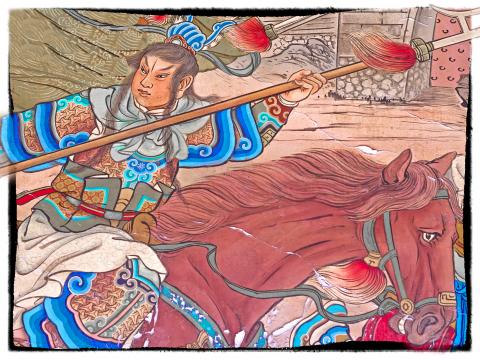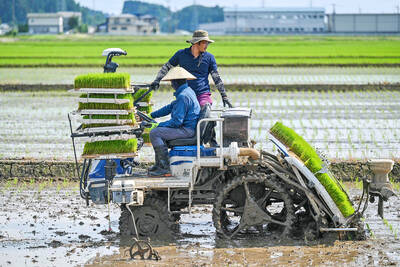Chinese Practice
破釜沉舟
po4 fu3 chen2 zhou1

Photo: Paul Cooper, Taipei Times
照片:台北時報記者古德謙攝
to smash the cooking pots and sink the boats
破釜沉舟,意即「將吃飯的鍋子打破,將船隻都鑿沉」,出自《史記》之「項羽本紀」。《史記》是兩千年前中國西漢司馬遷所著。
項羽是秦朝(西元前221-206年)末年的一位將軍。破釜沉舟這個成語講的是項羽憑著他的軍事毅力與才幹,率軍以一敵十與秦軍交戰。
為了激勵士卒,開戰前,他命士兵將煮飯的鍋子打破、將船鑿沉,讓所有人知道這一戰義無反顧,沒有退路。除了贏,他們沒有其他選擇;撤兵已經是不可能的事了。
英文裡,我們可以用「burn bridges」來形容,意思就是將退路給截斷。這句英文可以用來比喻一個別無選擇的情況,非何做某件事不可。
然而,中文的「破釜沉舟」表現的是為了完成某個目標義無反顧的決心,英文的「burn bridges」指的則是處在一個別無選擇的情況,未必是下定決心要做什麼事。
1. 為了通過律師考試,她破釜沉舟,跟男朋友分手了。
(In order to concentrate on passing the bar exam, she split up with her boyfriend.)
2. 傑森並非優柔寡斷,一旦下定決心,就會破釜沉舟去做。
(Jason is very decisive. When he makes up his mind to do something, he does it.)
英文練習
Burn bridges
The idiom 破釜沉舟 — "to smash the cooking pots and sink the boats” — actually comes from the Annals of Xiang Yu (項羽本紀) in the Records of the Grand Historian (史記), written by the Western Han historian Sima Qian 2,000 years ago.
Xiang Yu was a general in the last years of the Qin dynasty (221 to 206 BC). This entry relates the story of how he first proved his military mettle, leading his army against a Qin force outnumbering his own men 10 to one.
He galvanized his forces by ordering them to destroy their cooking pots and boats before going into battle, to press home the point that there was literally no turning back: that they had no choice but to win, and withdrawal was not an option.
In English, we can say that somebody has “burned their bridges.” In the literal sense, this means cutting off your means of retreat. In a metaphorical sense, it means leaving yourself with no alternative, and so forcing your hand, often — but not necessarily — intentionally.
The English and Chinese phrases differ slightly, in that the Chinese is used to bolster resolve, whereas the English refers to the possibility of leaving options open.
1. I’ve been offered the job, but I’m still going to the other interview. No sense in burning my bridges.
(我已經錄取這份工作,但我還是要去另一個工作面試。沒必要讓自己別無選擇。)
2. I was willing to forgive him, but that last email was so offensive. He’s really burned his bridges with me now.
(我本來願意原諒他,但他最後一封信太傷人了,讓我別無選擇。)

Rice is essential to Japanese culture, tradition and politics. People take pride in the oval-shaped sticky Japonica grain, which is still a staple even though total consumption has fallen over the decades. But since last summer, prices have soared as supplies have fallen short of demand. The government has long paid farmers to cut back on rice acreage, and change to other crops to keep rice prices relatively high. To cope with shortfalls this year, the government has released rice reserves. But the grain has been slow to reach supermarket shelves. Anger over that was part of the reason the Agriculture Minister

Step into any corner of Turkiye, and you’ll likely encounter the iconic “Evil Eye,” known as “nazar boncu?u” in Turkish. This striking blue glass ornament is shaped like an eye with concentric circles of dark blue, white, and light blue. While its name in English suggests something threatening, it’s actually a charm designed to ward off misfortune. The origins of the nazar boncu?u can be traced back to ancient Mediterranean and Middle Eastern traditions. The word nazar comes from Arabic, meaning “gaze,” while boncu?u translates to “bead” in Turkish. Central to the nazar boncu?u’s mythology is the idea that

A: Wow, Les Miserables Staged Concert Spectacular is visiting Taiwan for the first time. B: Isn’t Les Miserables often praised as one of the world’s four greatest musicals? A: Yup. Its concert is touring Taipei from tonight to July 6, and Kaohsiung between July 10 and 27. B: The English version of the French musical, based on writer Victor Hugo’s masterpiece, has been a huge success throughout the four decades since its debut in 1985. A: The musical has never toured Taiwan, but going to the concert sounds like fun, too. A: 哇,音樂劇《悲慘世界》紀念版音樂會首度來台巡演! B: 《悲慘世界》……它不是常被譽為全球四大名劇之一嗎? A: 對啊音樂會將從今晚到7月6日在台北演出,從7月10日到27日在高雄演出。 B: 這部法文音樂劇的英文版,改編自維克多雨果的同名小說,自1985年首演以來,在過去40年造成轟動。 A:

Continued from yesterday(延續自昨日) https://www.taipeitimes.com/News/lang In 1946, the company adopted the name 7-Eleven to reflect its newly extended __3__, from 7am to 11pm, a novel concept at the time. As a rapidly growing company, it began offering franchise opportunities in the 1960s. In 1974, the first 7-Eleven in Japan was opened by the supermarket company Ito-Yokado. The Japanese franchises were __4__ successful that by 1991, Ito-Yokado was able to acquire a 70 percent stake in Southland Corporation. Its investments eventually resulted in full ownership of 7-Eleven, which paved the way for the Japanese company to enter the international market. Since then, 7-Eleven